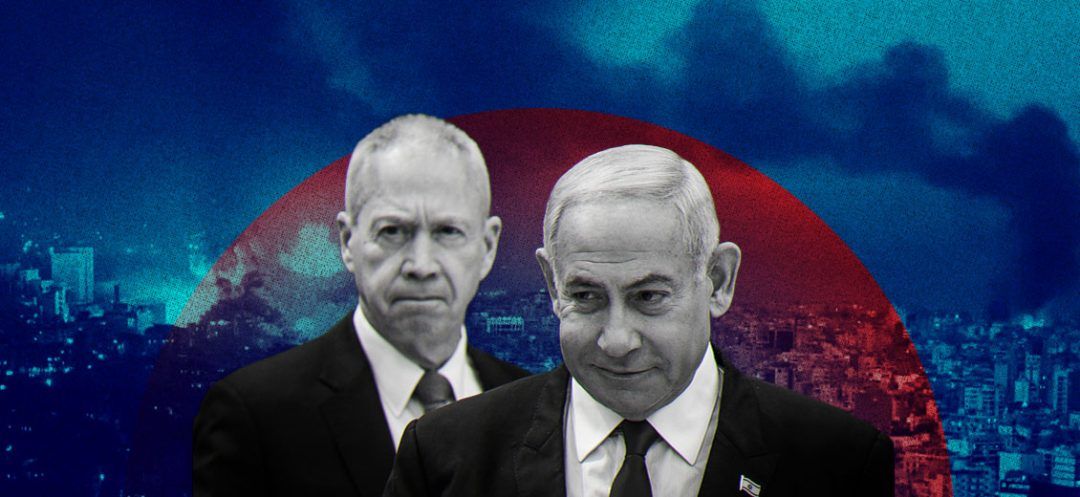
On Friday, September 27, Israel launched its most extensive military operation against Hezbollah since the opening of the southern front line on October 8, 2023, decapitating the group. The strike resulted in the death of Hezbollah Secretary-General Hassan Nasrallah and the elimination of several key commanders of the pro-Iranian formation.
Meticulously executed in Hezbollah’s stronghold in Beirut’s southern suburbs, this large-scale offensive likely resulted from an unexpected collaboration between Israeli Prime Minister Benjamin Netanyahu and Defense Minister Yoav Gallant. Historically at odds since the government’s formation, their recent cooperation in the war against Lebanon comes as a surprise given the intense tensions between them.
For several months, these two prominent figures in the Israeli Executive had been locked in a fierce power struggle behind the scenes. Out of the public eye, Benjamin Netanyahu and Yoav Gallant engaged in a silent yet relentless battle for influence, each vying to impose their vision for military strategy against Hamas in Gaza and Hezbollah in Lebanon. This intensified rivalry has significantly shaped governmental decisions, making their recent cooperation all the more surprising. This retrospective examines their tumultuous and tense relationship, where personal interests and disagreements often overshadowed national unity.
A Sequence of Confrontations
The power struggle between Israeli Prime Minister Benjamin Netanyahu and Defense Minister Yoav Gallant regarding the war in Gaza represents a pivotal moment in a series of confrontations that have significantly weakened the cohesion of the Israeli government over the past 18 months.
While Gallant has been unwavering in his stance on security issues, particularly concerning Hamas, he has openly criticized Netanyahu's repeated calls for “total victory,” labeling it a “chimera”. One of their most intense clashes occurred during a late-night meeting of the Israeli security cabinet on August 29 and 30.
According to multiple reports from CNN, they engaged in a heated dispute regarding the Israeli army's evacuation of the Philadelphi Corridor, a strategically crucial area along the Gaza-Egypt border, as part of a potential ceasefire agreement and the release of hostages.
Nevertheless, the internal divisions within the Israeli political landscape forced Netanyahu and Gallant to maintain a tense collaboration.
The previous year, amid protests against Netanyahu's proposed Supreme Court reforms, Gallant voiced his opposition, arguing that the initiative threatened national security by deepening societal divisions in Israel. Consequently, Netanyahu dismissed him, only to swiftly reinstate him due to mounting pressure from massive protests.
A Coalition with a Multifaceted Composition
Gallant’s continued presence in the government reflects the complex composition of the coalition, which is supported by two nationalist religious parties led by Bezalel Smotrich and Itamar Ben-Gvir. Their influence makes Gallant's departure politically risky and heightens tensions with their ministers, who view him as overly lenient toward Palestinians, particularly Hamas.
The latest critical episode in the Netanyahu-Gallant confrontation revolves around the situation in Lebanon. Approximately ten days ago, Israeli media reported that Netanyahu was considering Gallant's dismissal. While several denials followed, they failed to quell the rumors, which only grew more detailed.
The disagreement revolves around a large-scale offensive in Lebanon. Sources close to Defense Minister Gallant indicate that he has expressed reluctance about a massive ground operation, especially in the Lebanese capital. Instead, he has advocated for precise, targeted strikes aimed at weakening Hezbollah's human and operational capabilities, to be executed in tandem with discussions for a political resolution. In essence, he firmly opposes total war, which now seems increasingly unavoidable. The name of Gideon Saar, a center-right MP and former Minister of Justice, had even emerged as a potential successor to Gallant. However, after the explosion of Hezbollah's booby-trapped transmission devices, Saar withdrew his candidacy, deeming that a change in leadership at the Defense Ministry would be too precarious in the current volatile climate.
Despite the sustained efforts of Washington, London, Paris, and other powers to bring an end to hostilities between Israel and Hezbollah, these initiatives were swiftly contradicted by the unwavering determination of the Israeli Prime Minister.
Change in Course
While Western powers viewed Yoav Gallant as a more receptive interlocutor, open to the demands of the White House, Downing Street, and the Élysée Palace, a unified political decision within the Israeli government ultimately took precedence over international negotiations for a political resolution.
It was reported that Netanyahu and Gallant found common ground on their strategy for Lebanon, securing tacit support from Washington through a telling diplomatic silence.
The proposed strategy involved a significant escalation of airstrikes across Southern Lebanon, the Beqaa Valley, the Beirut southern suburb, and other strategic areas, with a potential ground invasion looming.
The Defense Minister’s shift is exemplified by his crucial role in the series of strikes that led to the assassination of Hezbollah Secretary General Hassan Nasrallah. Gallant personally oversaw the operations from the crisis room in Tel Aviv, coordinating closely with the Prime Minister, who was in New York at the time.
According to available information, the decision to carry out this assassination was approved by the war cabinet—comprising both Netanyahu and Gallant—several days in advance, as corroborated by multiple international media outlets.
Despite some lingering disagreements, it seems that Benjamin Netanyahu and Yoav Gallant have managed to find common ground regarding their approach to Lebanon.
According to reports from the Times of Israel, the Defense Minister had been excluded from at least three recent high-level security consultations held by the Prime Minister with key ministers as hostilities with Hezbollah escalated. Nevertheless, Gallant now appears equally determined to get rid of Hezbollah. His unwavering support for the intensified airstrike campaign targeting the group's stronghold in the Beirut southern suburb—escalated since Friday evening—highlights this new hardline stance. This shift notably signals a strategic alignment with Netanyahu in managing the conflict.
Despite tensions, disagreements, and complex political maneuvering, the relationship between Benjamin Netanyahu and Yoav Gallant embodies, in many ways, the paradoxes of a nation at war. What initially appeared to be an irreconcilable personal conflict has gradually evolved into a circumstantial alliance, forged by the imperatives of an unyielding military strategy.
History often judges leaders by their victories and failures, yet it’s still too early to determine whether this agreement, forged in the heat of battle and the rubble of dissent, will prove resilient or fade away as the dust of the bombing settles.
What is certain, however, is that beneath the shadow of airstrikes, beyond the crisis rooms and international negotiations, another battle is unfolding—one centered on trust and power.
In this shadowy realm, Israel and its leaders seem to be crafting a narrative where every decision, regardless of its intent, bears an extraordinary significance.




Comments